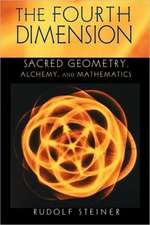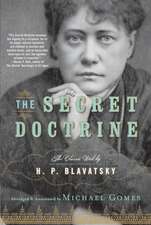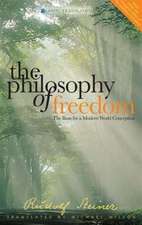Rudolf Steiner: Bloomsbury Library of Educational Thought
Autor Professor Heiner Ullrich Professor Richard Baileyen Limba Engleză Paperback – 22 oct 2014
| Toate formatele și edițiile | Preț | Express |
|---|---|---|
| Paperback (1) | 251.83 lei 6-8 săpt. | |
| Bloomsbury Publishing – 22 oct 2014 | 251.83 lei 6-8 săpt. | |
| Hardback (1) | 864.11 lei 6-8 săpt. | |
| Bloomsbury Publishing – 14 mar 2008 | 864.11 lei 6-8 săpt. |
Din seria Bloomsbury Library of Educational Thought
- 13%
 Preț: 251.83 lei
Preț: 251.83 lei - 22%
 Preț: 250.45 lei
Preț: 250.45 lei - 13%
 Preț: 250.55 lei
Preț: 250.55 lei - 13%
 Preț: 251.39 lei
Preț: 251.39 lei - 13%
 Preț: 251.57 lei
Preț: 251.57 lei - 13%
 Preț: 250.45 lei
Preț: 250.45 lei - 13%
 Preț: 251.83 lei
Preț: 251.83 lei - 13%
 Preț: 250.45 lei
Preț: 250.45 lei - 13%
 Preț: 256.12 lei
Preț: 256.12 lei - 13%
 Preț: 250.01 lei
Preț: 250.01 lei - 13%
 Preț: 251.39 lei
Preț: 251.39 lei - 13%
 Preț: 253.75 lei
Preț: 253.75 lei - 13%
 Preț: 257.50 lei
Preț: 257.50 lei - 13%
 Preț: 256.12 lei
Preț: 256.12 lei - 13%
 Preț: 257.97 lei
Preț: 257.97 lei - 13%
 Preț: 250.45 lei
Preț: 250.45 lei - 13%
 Preț: 252.42 lei
Preț: 252.42 lei -
 Preț: 300.62 lei
Preț: 300.62 lei -
 Preț: 251.51 lei
Preț: 251.51 lei -
 Preț: 238.53 lei
Preț: 238.53 lei -
 Preț: 272.29 lei
Preț: 272.29 lei -
 Preț: 274.53 lei
Preț: 274.53 lei - 22%
 Preț: 225.49 lei
Preț: 225.49 lei -
 Preț: 273.86 lei
Preț: 273.86 lei
Preț: 251.83 lei
Preț vechi: 288.96 lei
-13% Nou
Puncte Express: 378
Preț estimativ în valută:
48.19€ • 50.13$ • 39.79£
48.19€ • 50.13$ • 39.79£
Carte tipărită la comandă
Livrare economică 14-28 aprilie
Preluare comenzi: 021 569.72.76
Specificații
ISBN-13: 9781472518897
ISBN-10: 1472518896
Pagini: 280
Dimensiuni: 156 x 234 x 18 mm
Greutate: 0.41 kg
Editura: Bloomsbury Publishing
Colecția Bloomsbury Academic
Seria Bloomsbury Library of Educational Thought
Locul publicării:London, United Kingdom
ISBN-10: 1472518896
Pagini: 280
Dimensiuni: 156 x 234 x 18 mm
Greutate: 0.41 kg
Editura: Bloomsbury Publishing
Colecția Bloomsbury Academic
Seria Bloomsbury Library of Educational Thought
Locul publicării:London, United Kingdom
Caracteristici
Explores why Steiner, perhaps the most controversially judged educational reformer, has had such a sustained influence on educational thought over a long period of time
Notă biografică
Heiner Ullrich is Professor of Educational Science at Johannes Gutenberg University, Mainz, Germany. He has written on Waldorf pedagogy, on concepts of childhood today and in the past and contributed to anthologies and qualitative empirical studies on secondary schools and private schools in Germany and in the German-speaking world. He is a member of the School Research section of the German Society of Educational Science.
Cuprins
Series Editor's PrefaceForewordProloguePart I: Intellectual Biography 1. Childhood and Youth Abroad: Scholastic Success and Intellectual Curiosity2. Studies and Work as a Tutor in Vienna: The Basis for an Idealistic Overview3. Archivist in Weimar: The Philosophy of Goethean Natural Science4. Writer and Speaker in Berlin: The Free Spirit Converts to Theosophy5. The Path to Geotheanum: The Elaboration of Anthroposophy as Science, Religion and Art6. A New Era: The Wisdom Teacher's Move to Social Reform and Renewal of EducationPart II: Critical Exposition of Steiner's Philosophical and Educational Work 7. Goetheanism: The Epistomological Early Works8. Anthroposophy: An Overview of Steiner's Basic Teachings9. The Path of Cognition10. Cosmology: Emanation of the Spirit and the World's Evolution11. Anthropology: Man's Fourfold Architecture12. Man's Functional Threefold Structure13. Biography as Reincarnation and Destinal Chain ('Karma')14. The Four Temperaments15. Ages and the Development of the Human Person16. The Concept of Education17. The Free Waldorf School18. A School in the Spirit of Anthorposophy?19. The Waldorf Pre-School and the Anthroposophical Curative EducationPart III: The Reception and Influence of Steiner's Work 20. Anthroposophy as a Philosophy Without Boundaries21. Anthroposophy as the Return of Mythical Thought Within Science22. Anthroposophy - A Modernized Form of Gnosis23. The Free Waldorf School: A School of Classic Progressive Education?24. Between Prohibition and Continuation as Experimental State School: The Ambivalent Interest of NSDAP in Waldorf School Practice25. The Importance of Waldorf Pedagogy for State Schools26. Waldorf Schools: The Dubious Character of their Fundamentals and the Prerequisites of their Success27. Learning from the Waldorf Schools - A New Dialogue and its ThemesPart IV: The Relevance of Steiner/Waldorf Schools Today 28. The Global Success of Rudolf Steiner's Pedagogy29. How Successful are Waldorf Schools? - Evaluation Studies30. What do Waldorf Pupils do after Graduation and how do they see their School in Retrospect? - Alumni Studies31. How do Teachers and Pupils View the Waldorf School? - Attitude Studies32. Class Teacher-Pupil Relationships at Waldorf Schools - A Current Research ContributionEpilogueBibliographyGlossaryIndex













